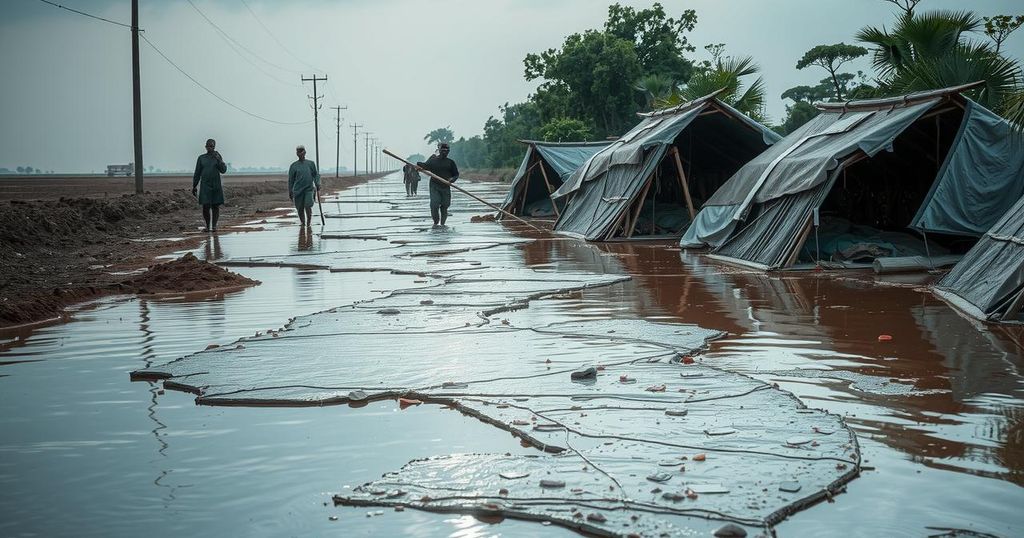Flooding in South Sudan has become an annual crisis, displacing over 379,000 people this year. Residents, like 70-year-old Bichiok Hoth Chuiny, have fled their villages, which have turned into swamps. The Jonglei Canal now serves as a refuge, though it lacks essential resources and services. With increasing reliance on humanitarian aid, the situation reveals the dire socio-political and environmental challenges facing the country.
In Ayod, South Sudan, the increasing frequency of flooding has resulted in considerable displacement as thousands seek refuge along a canal. Bichiok Hoth Chuiny, a 70-year-old resident, recounts her struggles after being forced to abandon her village of Gorwai, which has been transformed into a swamp due to relentless floods. This year alone, over 379,000 individuals have been displaced by such disasters, showcasing South Sudan’s vulnerability to climate change, as noted by the World Bank.
Historically, seasonal flooding has been integral to the pastoral lifestyle around the Sudd wetlands. Data indicates that since the 1960s, the swamp has expanded, devastating agricultural land and decimating livestock. The local communities, including the Dinka, Nuer, and Murle, find it increasingly difficult to sustain their cattle herding and agricultural practices.
The plight of the residents is compounded by South Sudan’s dire socio-political context, marked by civil war since 2013, unresolved crises, and increasing numbers of internally displaced persons (IDPs) due to conflict and floods. This year’s flooding has been exacerbated by upstream dam operations in Uganda following high water levels in Lake Victoria.
The Jonglei Canal, initially conceived over a century ago, now serves as a sanctuary for many, yet it lacks vital resources. As Peter Kuach Gatchang, the paramount chief of Pajiek, explains, the community is deprived of a school and clinic, necessitating a lengthy journey to access basic health services.
Residents rely heavily on humanitarian aid, with organizations like the World Food Program providing critical support. Nyabuot Reat Kuor, a displaced mother, spoke of the destruction of her village, highlighting the grim reality of food scarcity and dependence on emergency assistance.
Additionally, health services are severely lacking; clinics are understocked, and medical staff have not been compensated for months. The ongoing economic crisis has disrupted essential services, exacerbating the public health risks in vulnerable communities. In the face of these challenges, the residents remain resilient, illustrating their enduring struggle amidst adversity.
The devastation caused by flooding in South Sudan is symptomatic of a broader environmental crisis exacerbated by climate change. With the country experiencing increasingly severe weather patterns, the once-stable seasonal floods are now a recurring calamity. South Sudan, which gained independence in 2011, grapples with a combination of environmental vulnerability and socio-political instability, resulting in significant humanitarian ramifications. Reports indicate that the country’s infrastructure and governance systems remain ill-equipped to address or mitigate the effects of such disasters.
Flooding in South Sudan has transformed the lives of many, disrupting communities and exacerbating humanitarian needs. As thousands flee their homes, the reliance on humanitarian assistance grows, intensified by the lack of basic amenities and health care in the newly formed communities. This situation underscores the urgent need for both immediate aid and long-term strategies to build resilience against future climate-related challenges, all while addressing the underlying socio-political issues that hinder recovery and adaptation.
Original Source: abcnews.go.com






